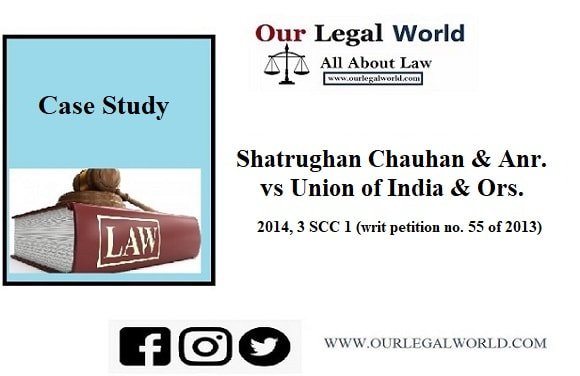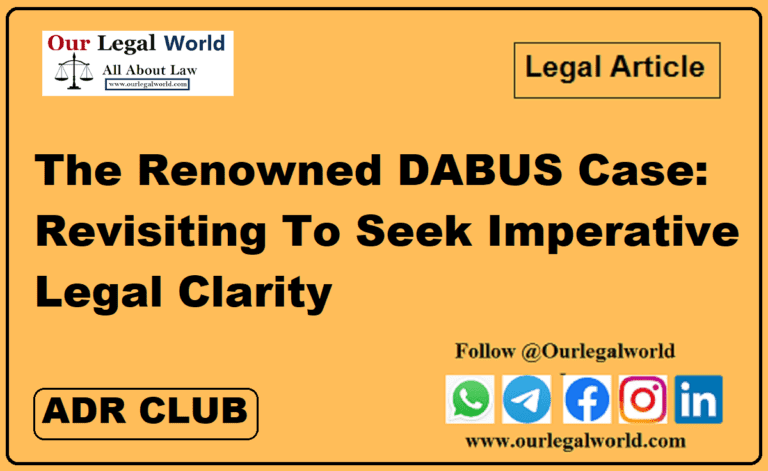Shatrughan Chauhan & anr. vs. Union of India & ors.: Case Analysis
In The Supreme Court of India Criminal Appellate Jurisdiction Case No. Writ Petition (Criminal) no. 55 of 2013 Appellants Shatrughan Chauhan & anr. Respondent Union of India & ors. Date of Judgement Decided on 21 Jan, 2014 Bench Hon'ble Justice P. Sathasivam , Justice Ranjan Gogoi and Justice Shiva Kirti Singh
INTRODUCTION
“Every civilized country recognizes and provides for the pardoning power as an act of grace and humanity in course of law”. As per this philosophy, according to the Constitutional framework in India, mercy petition to the President is the last constitutional recourse a convict can resort to when he is sentenced by the court of law. A convict can present a mercy petition to the President of India under Article 72 and in the same manner the power to grant pardon is also bestowed upon the Governors of States under Article 161 of the Constitution of India. Article 21 inheres a right in every prisoner/convict till his last breath and that right is to be protected even if the noose is being tied on the condemned prisoner’s neck and for this sole reason, a convict is given the right to file for a mercy petition as a last resort which is to be decided considering the supervening events which are crucial for deciding the same.
In the petition, the convict has to enumerate the grounds upon which he/she requests for the grant of pardon. These grounds may not have any value in the eyes of law for exonerating the accused person from the offence, but they may play an important role in the release of the person by the President. The grounds, the physical fitness of the convict, or the age or an error committed by court inadvertently, may be taken into consideration at the time of disposal of the mercy petition.
It was reiterated in Kehar Singh v Union of India[1]that the grant of pardon by the President is an act of grace and, therefore, cannot be claimed as a matter of right. The pardoning power is based on the consideration of public good and is to be exercised on the grounds of public welfare, which is the legitimate objective of all punishments. The power vested in the President under Article 72 and the Governor under Article 161 of the Constitution is a Constitutional duty. As a result, it is neither a matter of grace nor a matter of privilege but is an important constitutional responsibility reposed by the people in the highest authority
FACTUAL BACKGROUND
- The present case, which revolves around the question of delay caused in deciding the mercy petition, was filed by the family members of death convicts- Suresh and Ramji, who along with 13 other convicts, were awarded with death sentence in 1997.
- In 2001, their criminal appeal was dismissed by the Supreme Court and in the same year the petitioners then filed for a mercy petition addressed to the President/Governor of India.
- Although, the mercy petition was rejected by the Governor however, the petitioners and their family members never received any information about the same.
- It took about 12 long years in gathering all the required papers, judgments of the trial courts, information regarding status of petitioners’ mercy petition etc.
- On 08.02.2013 the President, too, rejected their mercy petition but it was only after two months that the petitioners got to know about the same via news reports as there was no written confirmation sent on part of the concerned authorities.
- The present case was filed keeping in view the undue and inordinate delay caused in deciding the mercy petition along with praying for commuting the death sentence of all death convicts into life imprisonment.
ISSUE INVOLVED
- Whether the delay caused in disposing off the mercy petition amounts as a violation of Article 21 of the death convicts?
- Whether the failure/delay on part of the Executive to dispose of the mercy petition filed under Article72/161 of the Constitution within a reasonable time can act as a sufficient ground for commuting death sentence into life imprisonment?
JUDGMENT
On 21st January 2014, the judgment in Shatrughan Chauhan & Anr v. Union of India was delivered by a three-judge bench. The Supreme Court while commuting the death sentence of all 15 convicts into life imprisonment held that undue, inordinate and unreasonable delay in disposing off the mercy petition is in itself a sufficient ground to entitle the convict to pray for commutation. The delay in rejecting the mercy plea by the President amounts to torture and is a clear violation of Article 21 of the convicts’ rights. The Supreme Court, at the same time, however, refused to fix up a certain number of years above which undue delay would amount as torture and laid out that the execution of sentence must only be done in consonance with the constitutional mandate.
CRITICAL ANALYSIS
In the case of Shatrughan Chauhan & Anr v. Union of India, a three-judge bench of Supreme Court delivered a landmark judgment dated 21st January 2014 on death penalty holding that an excessive delay in carrying out the death sentence was an essential mitigating factor in a plea for commutation. The Court held that, in the absence of proper, plausible and acceptable reasons for the delay, the delay of twelve years in considering the mercy petition is a relevant ground for the commutation of death sentence into life imprisonment.
The Court was of cogent view that undue, inordinate and unreasonable delay in execution of death sentence does certainly attribute to torture which indeed is violation of Article 21 and thereby entails as the ground for commutation of sentence. Article 21 can be rightly described as the “heart and soul of fundamental rights” which entails that no one should be deprived of his/her life or personal liberty except according to a procedure established by law. To any civilized society, there can be no attributes more important than the life and personal liberty of its members. As quoted by P. Sathasivam, CJI, “Our Constitution is highly valued for its articulation. One such astute drafting is Article 21 of the Constitution which postulates that every human being has inherent right to life and mandates that no person shall be deprived of his life or personal liberty except according to the procedure established by law.”
The twin attributes of right to life and personal liberty enjoy a fundamental ascendancy over all other attributes of the political and social order. Article 21 of the Constitution does not end with the pronouncement of sentence but extends to the stage of execution of that sentence, as already asserted, prolonged delay in execution of sentence of death has a dehumanizing effect on the accused. Delay caused by circumstances beyond the prisoners’ control mandates commutation of death sentence as done by the court in this case. The court rightly commuted death sentence to life imprisonment because delay causes physical and psychological agony to the convict which leads to torture; thus, it is a clear violation of Article 21. In furtherance to that, it would be rightful to highlight that the Supreme Court, which is the sole protector of the values enshrined in the Indian Constitution, not only did it widen the scope of Article 21 with respect to the convicts’ rights but also helped respect the international norms as set by International Covenant on Civil and Political Rights to which India is a signatory. Since our domestic law is almost on the same footing as that of international law, the Court took into account “insanity” as a supervening circumstance and clearly remarked that to execute an insane person who is not in a position to understand the nature of his deeds and who cannot defend himself would be a sheer violation of his rights.
It is indeed worthy to consider the fact that the basic tenet of our country’s criminal justice system is to even preserve certain rights of a person who has been convicted of an offence, Article 21 being the most important. Executing a person who has lost his sanity is not only against the notion of humanity but is in contradiction to the law of the land as well. By commuting the death sentence of two death convicts into life imprisonment, taking into consideration their chronic psychotic illness the Court, not only did conform with the international and domestic legal standards but also set up a good example for all other countries that the execution of the sentence shall also be in consonance with the constitutional mandate.
It may also be noted that in the present case, the Supreme Court, by exercising limited judicial review acted as a touchstone for understanding the federal structure of our Constitution. Commuting the death sentence into life imprisonment by holding undue and unreasonable delay as an essential mitigating factor, this Court in a way sets out a system of checks and balance, thereby indicating that the Executive, too, shall be held accountable for their actions.
The fact that Shatrughan Chauhan case has laid down guidelines to protect the right to life and personal liberty of death-row prisoners, as enshrined under Article 21 of the Constitution is also commendable. These guidelines have put an end to the disparities in implementing the already existing laws for safeguarding the interest of the death row convicts.
Also Read: 30 Important Case Laws on RTI
1. Solitary confinement: In the case of Sunil Batra vs. Delhi Administration[1] solitary confinement was held unconstitutional prior to rejection of mercy petition by the President. The rules of Prison manuals of different states should not be interpreted to run counter to the above ruling and violate Article 21 of the Constitution.
2. Legal Aid: The convict is entitled to legal aid under Article 21 at all stages until his last breath irrespective of the fact that his plea is rejected by the president.
3. Procedure in placing the mercy petition before the President: The Court has framed guidelines and prescribed a procedure for disposal of mercy petitions filed by the death convicts after disposal of their appeal by the Supreme Court.
. Communication of Rejection of Mercy Petition by the Governor: The convict is entitled to be informed in writing of the decision on his mercy petition. The rejection of the mercy petition by the Governor should forthwith be communicated to the convict and his family in writing or through some other mode of communication available.
5. Communication of Rejection of the Mercy Petition by the President: Same as the case for Governor, the rejection of the mercy petition by the President should forthwith be communicated to the convict and his family in writing.
6. Death convicts are entitled as a right to receive a copy of the rejection of the mercy petition by the President and the Governor.
7. Minimum 14 days’ notice for execution: This duration allows the convict to prepare himself mentally for execution, to make his peace with god, prepare his will and settle other earthly affairs. It allows the convict to have a last and final meeting with his family members.
8. Mental Health Evaluation: Some death-row prisoners lose their mental balance on account of prolonged anxiety and suffering experienced on death row and for this purpose there should, be regular mental health evaluation of all death row convicts and appropriate medical care should be given to those in need.
9. Physical and Mental Health Reports: All prison manuals give the Prison Superintendent the discretion to stop an execution on account of the convict’s physical or mental ill health. For this reason, when the mercy petition is rejected and the execution warrant is issued, the Prison Superintendent should satisfy himself on the basis of medical reports by Government doctors and psychiatrists that the prisoner is in a fit physical and mental condition to be executed.
10. Furnishing documents to the convict: Most of the death row prisoners are quite poor and do not have copies of their court papers or judgments. These documents are must for preparation of appeals, mercy petitions and accessing post-mercy judicial remedies which are available to the prisoner under Article 21 of the Constitution. 11. Final Meeting between Prisoner and his Family: It is necessary that the prison authorities allow a meeting of Prisoner with his family or friends before execution for the sake of humanity and justice.
12. Post Mortem Reports: These guidelines make it obligatory for post mortem to be conducted on convicts after execution.
Besides outlining some important guidelines, tremendous judicial skill by clarifying judgements in Bhullar Case and Triveniben Case is showcased in the present Shatrughan Case. The Supreme court acting as a court of record has rightly overruled its own verdict in Devender Pal Singh Bhullar v. State (NCT) of Delhi[1] case in which it had held that delay in deciding mercy plea cannot be a ground for commutation of death sentence. The Supreme Court in this case concluded that those sentenced to death for terrorist offences could not invoke the argument for inordinate delay in disposing of mercy petitions due to the nature of the crimes. While clarifying and relying on Triveniben v. State of Gujarat[2] the Court led to a conclusion in Chauhan case that inordinate delay in disposing of mercy petitions amounts to torture and nature of the crime must have no relevance in that determination. While relying on Triveniben case to come to the conclusion that the classification of terrorist and non-terrorist offences in the context of inordinate delay in disposing of mercy petitions is constitutionally invalid. The judges in this case have thus concluded that they have not created new jurisprudence and have only clarified the content and application of earlier judgment[3].
Though the commutation of death sentence of the petitioners is an appropriate decision since there was an unprecedented delay of 12 long years, this judgment can set out a bad precedent for times to come. The commutation of sentence only based on delay will make a complicated legal situation. As Supreme Court acts as a court of record, for the subsequent cases it would mean that whenever there is an executive delay it would result in commutation of the death sentence into a life imprisonment or a milder punishment. However, it is pertinent to note that there may be situations when the executive delay in reasonable and justified due to some unavoidable or unforeseen circumstances. In such a case the commutation of sentence would amount to denial of justice to the aggrieved party ultimately destroying the very essence of justice. As a suggestive measure, it would be recommended that since the guidelines are silent on the limitation period of filing of a review and a curative petition by the petitioner, a time limit of maximum 7-10 days should be imposed so that the justice is not further delayed to the victim. It would cause psychological agony for the victim’s family who, in the name of justice, would wait for the execution of the convicts. It is rightly quoted by Brent Weeks, “Delayed justice is as bad as injustice”. A victim, whether himself or his family, too shall be treated with equal fairness, dignity and respect and their rights should be equally respected. Lastly as it is rightly quoted by Eleanor Roosevelt “Justice cannot be for one side alone, but must be for both”, so the need is for the judiciary to be able to strike a balance between both accused’s rights as well as the victim’s rights which can be done by following the path of guidelines which are enshrined in this case to deal with subsequent cases relating to executive delay and the commutation of death sentence in order to be able to render justice in real sense.
[1](1978) 4 SCC 494
[1]AIR 1989 SC 653
[1](2013) 6 SCC 195
[2](1988) 4 SCC 574
[3] https://shodhganga.inflibnet.ac.in/bitstream/10603/208018/11/9_%20chapter%206.pdf (Aug. 04, 2020, 08:30 PM)
Author: Chahat Kapoor & Shruti Sharda
This Case Comment was shortlisted in 1st Our Legal World National Case Comment Writing Competition 2020







